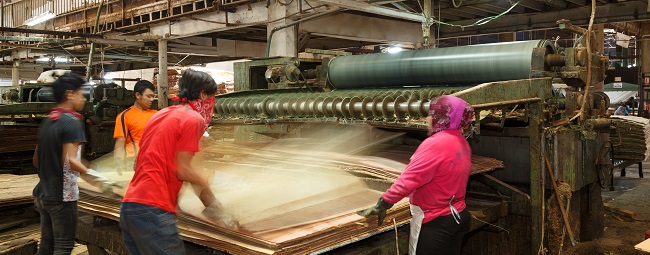FAISALABAD (ABC) – Textile exporters in Pakistan are perturbed over the prevailing economic situation of the country, saying that shortage of funds and high interest rates are hindering textile exports and the industry’s growth.
Faisalabad is known as the textile capital of Pakistan, providing employment to hundreds of thousands of people hailing from different cities.
However, the exporters are in a quandary due to high interest rates, surging cost of doing business and economic uncertainty.
Talking to WealthPK, Patron-in-Chief of the Pakistan Textile Exporters Association (PTEA) Khurram Mukhtar expressed concern over the current economic uncertainty, saying that the situation was not favorable for the business environment and was hindering long-term planning.
He said limited availability of funds and high interest rates were hampering the growth of exports and industrialization.
Hefty borrowing neither favors the industry nor the country, he added.
He said textile was the largest manufacturing sector fetching the much-needed forex for Pakistan; however, it was facing negative impacts leading to economic slowdown.
“Textile exports declined from $1.74 billion in April 2022 to $1.18 billion in February 2023.
Currently, it is stagnant at around $1.4 billion per month, $600 million below the installed production capacity,” he said.
He said the current record high interest rate of 22% was badly hitting the export sector, while the policy rate of regional countries, including India, Bangladesh, Sri Lanka and Vietnam, ranged from 4.5% to 11%.
Owing to the low policy rate, Pakistan’s business rivals are taking advantage in the international market, he added.
Mr. Mehmood, another textile exporter, said billions of rupees refunds were stuck with the government and despite repeated requests, nothing was being done to repay refunds to the exporters.
He asked how exporters could perform efficiently with a liquidity crunch.
“It’s been a longstanding practice of the government to delay the issuance of refunds.
This approach has led to a catastrophic situation for many exporters, forcing them to exit the textile business,” Mehmood claimed.
He said shortage of funds had forced the exporters to seek loans at high interest rates, which was negatively hitting their business.
He also claimed that the exporters were losing international customers due to the lower rates being offered by the rival countries.
Mehmood lamented that billions of rupees invested by the exporters in the textile sector will go to waste if they failed to compete with their business rivals.
The PTEA patron-in-chief said the government must realize the importance of the large-scale manufacturing (LSM) sector, which was almost a quarter of the country’s GDP.
During July to January period of the Financial Year 2023-24, the textile sector’s output growth declined by less than 1%.
He said the national economy was facing serious threats due to multiple issues like high inflation, depleting foreign exchange reserves, declining foreign direct investments, growing current account deficit and fiscal imbalances.
“The government should waste no time and readdress such issues by adopting pragmatic measures that can help entrepreneurs boost their productivity.
Without removing bottlenecks, we cannot put the textile export on track of growth,” he said.
He said currently Pakistan needed structural policy initiatives to bolster economy.
Faizan Ahmed, a fabric trader, said growth in exports was mandatory for the businesses attached with the textile industry directly or indirectly.
Currently, spinning, dyeing, processing, packaging and other industries are connected to this sector, contributing to strengthening the national and local economy.

